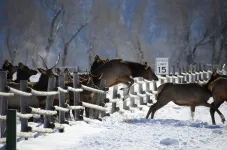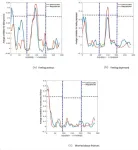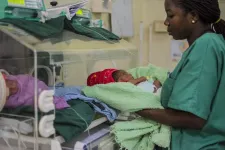(Press-News.org) Coupled field observations and phytoclimatic modeling show that the distribution of African forest and savanna ecosystems are highly predictable by climate, researchers report in a new study. The findings suggest that the effects of climate change on the distribution of African forests and savanna may be more easily forecasted than previously recognized. An important yet challenging goal for ecological science is predicting how global vegetation patterns will be altered by ongoing climate change. Generally, the distribution of Earth’s vegetation biomes is determined by climate. However, at local or regional scales, multiple ecosystem types can occur under a single climate regime depending on past disturbances and species interactions. For example, across the global tropics, forest, and savanna biomes are both observed in regions that receive between 1000 and 2500 millimeters of annual precipitation. This observation has led to the emergence of the alternative ecosystem state (AES) hypothesis, which states that qualitatively different AES ecosystems are self-maintaining and cannot be predicted from environmental forcing factors, such as climate. To date, the AES hypothesis has been difficult to reconcile within ecosystem prediction models used to forecast the potential impacts of climate change. Here, Steven Higgins and colleagues evaluate how well a climate-based prediction model can predict the distribution of forest and savanna across tropical and subtropical Africa. They compare predictions from a novel plant growth model and phytoclimatic transform, which combines plant species distribution data and climate system data to estimate the ability of climate to support different species in a given ecological niche, to a benchmark spatial dataset of defined savanna and forest sites across Africa. Higgins et al. show that the model is able to predict forest versus savanna occurrence with high accuracy. According to the authors, the findings suggest that spatial variation in climate is the dominant influence on ecosystems at both large and relatively fine scales, challenging the view that climate alone cannot predict AES over large swaths of the Earth’s surface.
END
Climate underlies African forest and savanna biomes
2023-06-08
ELSE PRESS RELEASES FROM THIS DATE:
Wild mammals moved farther during severe COVID-19 lockdowns
2023-06-08
Tucker and 174 colleagues, including members of the COVID-19 Bio-Logging Initiative, analysed global data from land mammals tracked by GPS devices. Tucker: “There were many media reports that nature was recovering during those first lockdowns. For example, cougars were roaming the streets of Santiago, Chile, but we wanted to know: is there any evidence of this? Or were people simply paying more attention to everything while being at home?”
Movements of mammals
Tucker and colleagues collated ...
Study: Southern states may have borne brunt of COVID-19 mental health impact
2023-06-08
LAWRENCE — A new study appearing today in the peer-reviewed journal PLOS ONE shows how federal and state lockdowns and health mandates implemented to curb the spread of COVID-19 affected the mental health of people living in four U.S. geographic regions and affiliated with two major political parties.
A group of faculty, staff and student researchers at the University of Kansas generated data-based maps to look for spatial trends and communities with similar mental health and COVID-19 outcomes. ...
Researchers find an immune system ‘trip wire’ that detects COVID-19
2023-06-08
Inflammasomes make up an intricate system of molecular sensors that our bodies use to sound an alarm when an infection occurs. However, the mechanisms behind these sensors, which initiate responses to threats such as invading pathogens, and how they operate has been an area of intrigue for immunologists.
In a new study, University of California San Diego biologists describe a previously unknown way that the immune system detects certain viruses. The inflammasome immune protein known as CARD8, they found, can serve as a trip wire to detect a range of viruses, including SARS-Cov-2, which causes COVID-19.
Adding ...
Without fully implementing net-zero pledges, the world will miss climate goals
2023-06-08
Without more legally binding and well-planned net-zero policies, the world is highly likely to miss key climate targets.
In the new study, led by Imperial College London and published today in Science, researchers ranked 90% of global net-zero greenhouse gas emissions pledges as providing low confidence in their full implementation.
The researchers recommend nations make their targets legally binding and back them up with long-term plans and short-term implementation policies to increase the likelihood of avoiding ...
Breakthrough: Scientists develop artificial molecules that behave like real ones
2023-06-08
Scientists from the Radboud University have developed synthetic molecules that resemble real organic molecules. A collaboration of researchers, led by Alex Khajetoorians and Daniel Wegner, can now simulate the behaviour of real molecules by using artificial molecules. In this way, they can tweak properties of molecules in ways that are normally difficult or unrealistic, and they can understand much better how molecules change.
Emil Sierda, who was in charge of conducting the experiments at Radboud University: ‘A few years ago we had this crazy idea to build a quantum simulator. We wanted to create artificial ...
Global study highlights deaths from neonatal sepsis and steps to improve treatment
2023-06-08
A global observational study co-led by UCL (University College London), which involved more than 3,200 newborn babies suffering from sepsis in 19 hospitals in 11 countries, has shown that many newborns are dying because the antibiotics used to treat sepsis are losing their effectiveness.
The study, conducted from 2018 to 2020, found there was high mortality among infants with culture-positive sepsis (almost 1 in 5 across the hospital sites), and a significant burden of antibiotic resistance. The study has provided a wealth of high-quality data aimed at improving the treatment of newborn babies with sepsis.
The findings of the observational study ...
Why certain fish are left off the hook
2023-06-08
As warming waters threaten fish populations and disrupt fisheries around the world, it is critical to find ways to sustain fisheries while at the same time allowing those fisheries to remain economically viable to those who depend on them for their livelihoods. In the United States, commercial fishing employs 1.2 million Americans and generates more than $165 billion annually.
The primary way that the United States has protected its fisheries is through the Magnuson-Stevens Act, which was modernized in 1996 to foster the long-term biological and economic sustainability ...
In schools that could benefit most, building relationships is key to increasing capacity for nutrition education programming
2023-06-08
Philadelphia, June 8, 2023 – The US Department of Agriculture Supplemental Nutrition Assistance Program-Education (SNAP-Ed) provides nutrition programming to individuals with low income, including students and their families, through a network of community partners who implement the programs. Findings of a new study in the Journal of Nutrition Education and Behavior, published by Elsevier, suggest SNAP-Ed implementers could develop a school’s readiness for programming by concentrating efforts on cultivating relationships, program-specific capacity, and motivation at schools.
Lead author Erin McCrossan, PhD, Office of ...
Study uncovers how B cells react to skin cancer
2023-06-08
A new study that sheds light on how B cells react to skin cancer cells could pave the way for innovative therapy design.
The study, published today in Nature Communications and led by researchers from King’s College London, reveals that antibody-producing B cells in patients may be defective in responding to the most aggressive skin cancer, melanoma.
Antibodies are produced by B cells, a type of white blood cell, and are made to prevent and help fight infections. However, there is limited understanding about how B cells are prompted to respond to melanoma and why the antibodies they make are not effective.
Researchers ...
Universities in California, Arizona, and Nevada form consortium to address clean water access and sustainability challenges
2023-06-08
A novel collaboration between the University of Southern California (USC), the University of Arizona (UA), and the University of Nevada, Reno (UNR), has resulted in the Water Reuse Consortium. This groundbreaking partnership has been awarded a $12.3 million cooperative agreement for phase one of a three-phase $38 million program with ERDC-CERL to tackle pressing water challenges through innovative research, education, communication, and unprecedented collaborative efforts between government, local communities, industry, and academia.
The Water Reuse Consortium brings together ...



